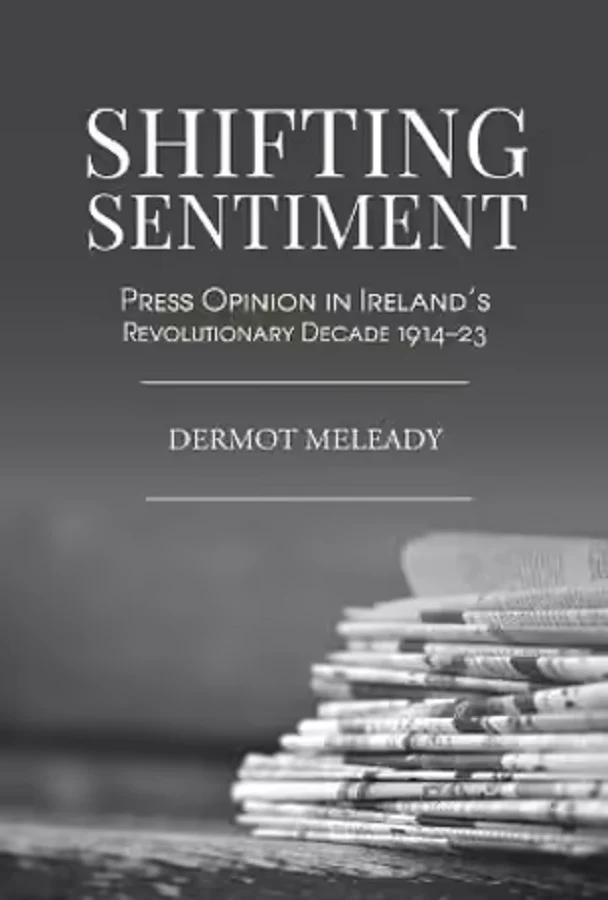
Ahead of his appearance at the Dublin Book Festival, Dermot Meleady offers insights into newspaper coverage of past political events
by Dermot Meleady
The growth of the market for provincial newspapers in Ireland was an inseparable part, first, of the general advance of literacy, and then of the development of nationalist political consciousness in the later nineteenth and early twentieth century.
From the historian’s point of view, perhaps the most interesting feature of the provincial press is the editorial commentary it offers on the day-to-day political events of the past. The study of such commentary offers a potentially fruitful means of gaining insights into public opinion in an era before the start of modern scientific opinion polling.
Histories of the tumultuous events of the second decade of the early twentieth century have referred sparsely to a small number of newspapers (the only mass media) of the time. Shifting Sentiment grew out of an interest in seeing whether received conclusions regarding press opinion were confirmed by a study of a larger sample of newspapers.
From the historian’s point of view, perhaps the most interesting feature of the provincial press is the editorial commentary it offers on the day-to-day political events of the past
The sample included two national Dublin-based dailies, two provincial dailies and 40 weekly or bi-weekly provincial papers, equal to about two-thirds of all those in circulation during the decade 1914 to 1923. Since the study aimed to assess nationalist opinion only, all the papers sampled were of that political persuasion, and were chosen from all regions of the island.
The majority of nationalist Ireland’s press basked in a cosy political consensus.
In summer 1914, the Third Home Rule Bill was approaching its third and final passage through the House of Commons. The Irish Parliamentary Party, representing nationalist Ireland with 74 seats at Westminster and led by the two Johns, Redmond and Dillon, was the undisputed political voice of the country. The peaceful process of farm purchase by tenant farmers under the 1903 Land Purchase Act was well under way, cottages for rural labourers were being built and the new university for Catholics had just opened in Dublin.
The majority of nationalist Ireland’s press basked in a cosy political consensus. Of the forty-two provincial papers in this study, thirty-two were loyal supporters of the Party, which was expected to pilot the ship of all-Ireland self-government into port during 1914. Another six were more reserved while only four harboured republican nationalist aspirations.
However, the stability of this political and press milieu was soon to be shattered by the onset of a three-part crisis: the outbreak of the Great War in August 1914, the resultant postponement of Home Rule and the effects of the strenuous opposition of a million Ulster unionist people on its prospects. In the midst of these came a fourth shock, the unforeseen armed rebellion in Dublin at Easter 1916.
Until late 1916, the loyalty of most papers to constitutional politics held fast. For example, on the war’s outbreak, the Westmeath Independent had backed Redmond’s pro-British stance with the headline “A Titanic Struggle – Bravo England!” When King George signed the Home Rule Act into law, the Clare Champion had hailed “a day of thanksgiving for the whole Irish race” adding that “Ireland will take her place in the Empire”.
Until late 1916, the loyalty of most papers to constitutional politics held fast
However, by early 1917, the editors of both of these papers and several others were abandoning their support for the Irish Party and switching their allegiance to the previously tiny but now burgeoning Sinn Féin movement.
What had changed? The new ferment in nationalist Ireland is often ascribed to public anger at the executions of the leaders of the rebellion. There is little evidence of that in this study: most papers condemned the rebellion and very few voiced anger at the executions.
The real trigger was the dawning realisation in nationalist Ireland that the Home Rule Act on the statute book, when it finally came to be implemented, would not apply to the whole island due to the exclusion of the majority-unionist areas of Ulster from its remit. The new prime minister, David Lloyd George, was determined to stick to the principle of his predecessor, Asquith, that the coercion of Ulster into Home Rule was an “absolutely unthinkable thing”.
most papers condemned the rebellion and very few voiced anger at the executions
A wave of public anti-partition anger washed over the Irish Party. Demoralisation and disillusion followed among Party supporters. A truncated Home Rule was felt by many to be worthless. In a clear case of public opinion leading the media, many newspapers were induced to change their editorial policies. By 1918, at least twelve papers had joined the Sinn Féin camp, with another four adopting neutrality. Thus was the stage set for the landslide Sinn Féin victory in the general election of December 1918.
Dermot Meleady joins Eileen Culloty, Jade Wilson, and Donal Fallon for Shifting Sentiment: Media Influence on Public Opinion at the Dublin Book Festival, Sunday 12 November.

This insightful panel event looks to the past and the present to ask ‘Is public opinion reflected or led by media coverage?’ Featuring Dermot Meleady author of Shifting Sentiment (Wordwell Books), Eileen Culloty (DCU School of Communications), Jade Wilson (Irish Times reporter) and chaired by Donal Fallon, this variety of expertise will provide a lively discussion on the role the media plays in reflecting or shifting majority sentiment.













